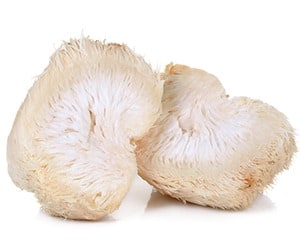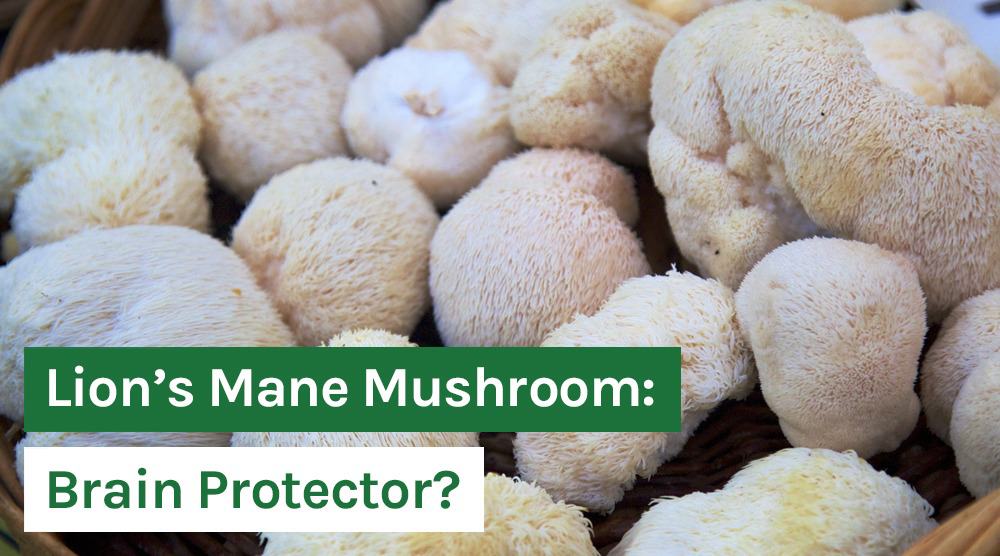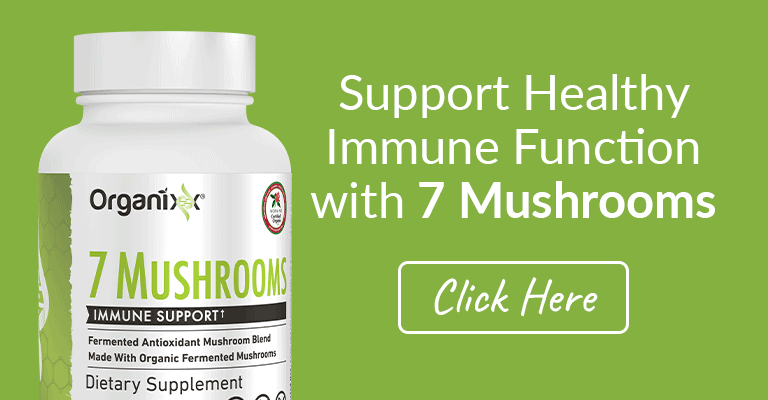Lion’s Mane Mushroom: Brain Protector?
In a hurry? Click here to read the Article Summary...
Mushrooms have been revered for centuries within many traditional societies as nutritional powerhouses as well as for their beneficial properties. Hericium erinaceus, also known as lion’s mane mushroom or hedgehog mushroom, is an edible (some might even say delicious) fungus with a long history of usage in traditional Chinese medicine (TCM). Indeed, east Asian legends state that consuming lion’s mane can confer “nerves of steel and the memory of a lion.”
Globular-shaped, with cascading teeth-like spines from which white spores emerge, lion’s mane mushrooms are also known as sheep’s head and bear’s head in various cultures, while the Japanese know it as yamabushitake.
This nutritious mushroom is 20% protein and is considered by food aficionados to be a gourmet dish when prepared properly, with a chewy texture and taste similar to popular seafoods such as lobster and shrimp.
Lion’s mane has recently been the topic of many medical studies and has been shown to help restore and maintain the health and growth of brain cells.

Furthermore, lion’s mane mushrooms are chockfull of potent compounds which have been credited with many beneficial properties.
Indeed, modern research shows that these mushrooms can even help boost the activity of the immune system against certain types of cancers.
Finally, H. erinaceus has also been reported to help protect against bacterial infections and help heal wounds faster, while also maintaining blood pressure and blood sugar in the healthy range.
Lion’s Mane Mushroom Brain Benefits
Lion’s mane mushrooms are increasingly being studied by the medical community for their powerful brain health effects.
Two novel compounds – known as hericenones and erinacines – in these mushrooms have been shown to activate a peptide found naturally in our bodies, known scientifically as “nerve growth factor” or NGF. NGF is critically important and necessary for the growth, maintenance, and survival of our brain cells, known as neurons.
These naturally occurring lion’s mane compounds also stimulate a process known as re-myelination. This proces helps to keep brain cells healthy, prevents them from being damaged, and increases their ability to conduct electrical signals efficiently. This ability of lion’s mane to protect brain cells may one day make it very useful for the treatment of otherwise debilitating neurological conditions.
Since 1991, many studies have been published on the beneficial properties of lion’s mane mushrooms in the brain.
For instance, a small clinical study published in 2009 showed that when lion’s mane was given to 50- to 80-year-old Japanese men and women, their brain capacity improved significantly – but only as long as they kept consuming the mushrooms.
In this study, 15 men and women took four tablets containing 96% Yamabushitake (the Japanese name for lion’s mane) three times daily for 16 weeks. These subjects were then observed for a further four weeks after the therapy period ended.
The study researchers noticed that the Yamabushitake group had significantly higher scores on their cognitive function. In other words, their ability to use their brains to learn and remember were better when compared with the control group. The longer they consumed the lion’s mane mushrooms, the better their scores were.
However, 4 weeks after the study ended and their consumption of mushrooms had stopped, the scores of the Yamabushitake group went down significantly. No adverse effects of Yamabushitake were reported throughout the study or afterwards.
This study shows that lion’s mane may help reverse problems with memory, language, thinking, and judgment that is normally seen with aging in elderly people, although further studies are necessary to assess its efficacy and safety.
What Research Shows About Lion’s Mane Mushroom & Alzheimer’s Disease
In certain laboratory models of mice, toxic peptides are used to induce learning and memory deficits.
These peptides induce the formation of messy clumps of proteins known as beta-amyloid plaques which form in the fatty membranes that surround brain cells and interfere with brain function. Beta-amyloid plaques are thought to play a major role in the development of brain diseases such as Alzheimer’s and Parkinson’s disease.
In one particular laboratory study, mice injected with these toxic peptides were taught to use a maze. As beta-amyloid plaques developed in their brains, the mice gradually lost their ability to memorize the maze.
Some of these mice were taken aside and fed a diet containing lion’s mane mushroom for 23 days, after which their memory and learning abilities were examined using the maze test. Mice given lion’s mane mushrooms showed a significant reduction in their beta-amyloid plaques along with a simultaneous noticeable improvement in their performance in the maze, compared to mice that did not get lion’s mane.
Interestingly, along with regaining their former brain functions, these mice also gained new skills – including something similar to curiosity, as indicated by more time spent exploring novel objects relative to familiar ones.
As the study authors state, “The results revealed that H. erinaceus prevented impairments of spatial short-term and visual recognition memory induced by amyloid β (25-35) peptide.”
In other words, consumption of lion’s mane prevented the impairment of both short-term and visual recognition memory induced by toxic peptides in mice. Short-term memory is our ability to hold a small amount of information in our minds in an active, readily available state for a short period of time.

Visual recognition memory has to do with our ability to recognize previously encountered events, objects, or people, to “remember” them.
Since both of these types of memories are lost in people with Alzheimer’s disease and other forms of dementia, this and other studies indicate that lion’s mane may one day be found helpful in slowing down or even preventing these types of memory deficits from happening at all.
According to the study authors, “This finding indicates that H. erinaceus may be useful in the prevention of cognitive dysfunction.”
Lion’s Mane Mushroom Research into Boosting Mood & Concentration
Lion’s mane mushrooms may also boost brain function in a different way… by making us feel good. In a small clinical study, 15 post-menopausal women who consumed lion’s mane baked into cookies reported being in a better mood relative to women who didn’t eat the cookies. The lion’s mane cookie group also showed a clear improvement in their ability to concentrate.
In fact, Asian Buddhist monks have been reported to consume lion’s mane tea before meditation to enhance their powers of concentration.
Given that lion’s mane can protect brain cells – can this mushroom potentially be used to treat people with age-related neurological conditions and help maintain their mental agility, mood, and concentration with age?
The answer to both these questions seems to be a resounding yes.
According to Paul Stamets, author and advocate of medicinal mushrooms, lion’s mane may be the first “smart” mushroom known to man. Safe and edible with clear benefits for our brain’s physiology and function, this powerful fungus will no doubt make the news for its powerful anti-aging properties in the near future.
7 Mushrooms from Organixx contains 7 of nature’s most powerful mushrooms for anti-aging, longevity, and immune support. Using centuries-old knowledge of the power of nutritional mushrooms and our breakthrough new formulation process we’ve unleashed the power of mushrooms in a way never before done.

 Sources:
Sources:
Article Summary
Lion’s mane mushrooms are increasingly being studied by the medical community for their powerful brain health effects.
Lion’s mane activates nerve growth factor, which is critically important and necessary for the growth, maintenance, and survival of our brain cells.
Lion’s mane may help reverse problems with memory, language, thinking, and judgment.
Studies revealed that lion’s mane prevented impairments of spatial short-term and visual recognition memory.
Lion’s mane mushrooms may boost brain function by making us improving mood and concentration.






Your website sucks! I wanted to order magnesium and mushrooms but the site makes it so damn difficult that I gave up and moved on to other vendors
Hi Neil,
We're sorry to hear that you were having some trouble placing an order via our website. Thanks for letting us know.
Not sure which link you were using to place your order, but feel free to check out this link: https://shop.organixx.com/ and try placing your order again if you can.
If you're still having any issues at all, please reach out to our Customer Success Team so they can help place the order for you.
You can find their contact info via the following link: https://support.organixx.com/649565-Contact-Us. They will be very happy to help you out.
Also, we're currently running our BIGGEST SALE OF THE YEAR where you can save up to 50% off all of our products.
https://shop.organixx.com/pages/q4-sale-2023?_gl=1*1oam95n*_gcl_au*MTg1MTE1NzI0NC4xNzAxMjYwMTM4*_ga*NjY2MzczNDEuMTcwMTI2MDEzOA..*_ga_L2VX25C2ZV*MTcwMTI4Mjk0OS4zLjEuMTcwMTI4Mjk1MC4wLjAuMA..
We hope you're able to take advantage of this limited-time offer while supplies last.
Thanks so much for being here with us. Wishing you a happy & healthy day.
What are the capsules made out of? I don't see that anywhere on label or bottle.
Here's the 7M+ label, Becky (https://s3-us-west-2.amazonaws.com/assets.checkout.carthook.com/mid_cdlWCVK6/1498601382464_7M-label-back.png). You may enlarge it by using the zoom icon. Also, you may learn more about the product here (https://shop.organixx.com/collections/all-products/products/7m-plus). Happy shopping!
I find fresh, organic Lion's Mane at a local Wegman's. Our Whole Foods sells a small tub of organic mixed mushrooms that includes Lion's Mane.
Is Lion's Mane safe to take if a person is having chemotherapy? Can it be given in conjunction with? How about after treatment, are there any recommended dosaging, or amounts to take?
Gona get on it.